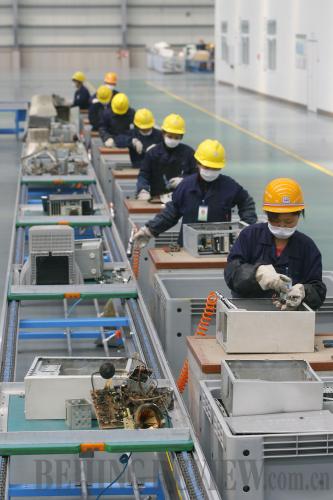|
 |
|
ELECTRONIC CLEANUP: Workers dismantle old electronic devices in an industrial park in Wuhan, capital city of Hubei Province. These efforts are part of a project to integrate electronic waste recycling in Wuhan and is the first of its kind in the city (XINHUA) |
Defense Transparency
The Chinese Government issued its seventh white paper on national defense on March 31. The white paper presents an overall picture of China's national defense ranging from the security environment, national defense policy, to defense expenditure and arms control.
The white paper says China's defense expenditure mainly comprises expenses for personnel, training and maintenance, and equipment, with each accounting for roughly one third of the total.
In the past two years, increases in defense expenditure have been used to improve support conditions for the troops and accomplish diverse military tasks, ranging from earthquake rescue and escort operations in the Gulf of Aden and waters off Somalia, says the white paper.
In view of the upward trend in purchasing prices and maintenance costs, it says China has moderately increased funding for hi-tech weaponry and equipment and its supporting facilities.
Environmental Roadmap
The State Council approved a plan on March 30 for preserving and protecting Qinghai-Tibet Plateau over the next two decades. The regions covered by the plateau include the Tibet and Xinjiang autonomous regions, as well as Qinghai, Sichuan, Yunnan and Gansu provinces.
The goal set by the State Council is, by 2030, that the plateau's ecological system should become balanced.
The region should be divided according to different functions, such as animal husbandry and ecological preservation, says the State Council.
It also lists work priorities such as restructuring local industry, enhancing biodiversity and reversing desertification, water loss and soil erosion.
An early warning mechanism for climate change and environmental monitoring should be created, the State Council says.
Dairy Licensing
Retailers of dairy products in China have been required to apply for new operating licenses or renew their old ones by the end of July.
Starting in April, dairy retailers should apply for one of two types of licenses. One will allow them to sell baby formula and the other will allow them to sell formula-free products, said the State Administration for Industry and Commerce.
Unlicensed retailers who sell infant formula would be punished, the administration said.
The Chinese Government has tightened regulation of food products in response to the public's safety concerns, which have grown more intense following discoveries of the toxic substance melamine in baby formula in 2008 and, more recently, of illegal additives in pork.
Dynamic Inventions
China received more than 391,000 applications for invention patents in 2010, the world's second largest number, said He Hua, Deputy Director of the State Intellectual Property Office.
Among the applications, 293,000 were submitted by domestic applicants, representing an increase of 27.9 percent year on year.
From 2006 to 2010, invention patent applications in China totaled 1.45 million, 2.6 times the figure from 2001 to 2005. | 